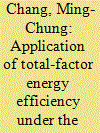| Srl | Item |
| 1 |
ID:
176801


|
|
|
|
|
| Summary/Abstract |
As the computation of total-factor energy efficiency (TFEE) is not workable under the metafrontier framework since the metafrontier cannot fully envelope each group frontier, this research provides a new computation mode to solve this problem. Following a discussion on the methodology, we conduct empirical analysis on 28 member countries in the European Union (EU) and then divide them into Baltic sea region (BSR) countries and non-Baltic sea region (NBSR) countries for metafrontier analysis, thus contributing to the literature by presenting an available mode for TFEE analysis under the metafrontier framework. The suggested mode herein operates so successfully that all computation scores exhibit a reasonable scope. In addition, the BSR's average energy efficiency performs better than NBSR's, but the latter is still a technology exporter compared to the former. This paper summarizes the conditions for sustainable energy development: (i) set more serious energy efficiency targets; (ii) reduce primary and final energy consumptions, lower energy dependence on energy imports, and increase the share of renewable energy sources to fossil fuel energy sources; (iii) achieve a liberalized energy market; and (iv) set reasonable energy prices by levying an energy tax in order to realize effective energy consumption.
|
|
|
|
|
|
|
|
|
|
|
|
|
|
|
|
| 2 |
ID:
103608


|
|
|
|
|
| Publication |
2011.
|
| Summary/Abstract |
This paper uses a total-factor framework to investigate energy efficiency in 23 developing countries during the period of 1980-2005. We explore the total-factor energy efficiency and change trends by applying data envelopment analysis (DEA) window, which is capable of measuring efficiency in cross-sectional and time-varying data. The empirical results indicate that Botswana, Mexico and Panama perform the best in terms of energy efficiency, whereas Kenya, Sri Lanka, Syria and the Philippines perform the worst during the entire research period. Seven countries show little change in energy efficiency over time. Eleven countries experienced continuous decreases in energy efficiency. Among five countries witnessing continuous increase in total-factor energy efficiency, China experienced the most rapid rise. Practice in China indicates that effective energy policies play a crucial role in improving energy efficiency. Tobit regression analysis indicates that a U-shaped relationship exists between total-factor energy efficiency and income per capita.
|
|
|
|
|
|
|
|
|
|
|
|
|
|
|
|